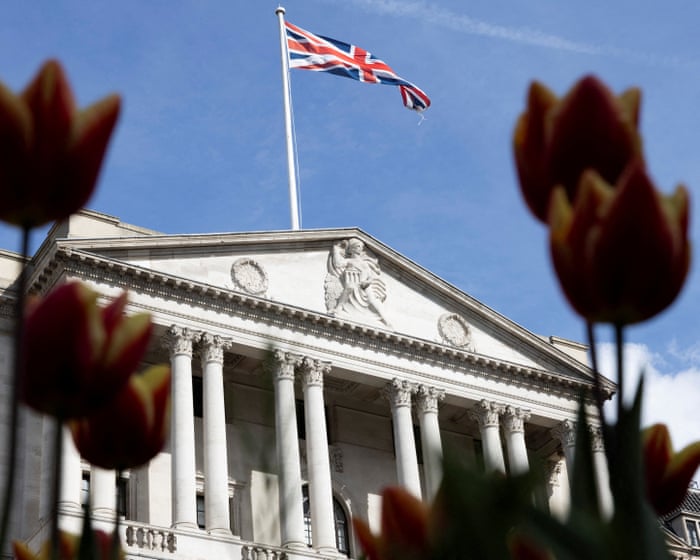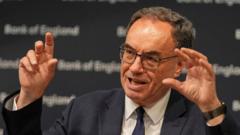See what’s trending right now
US stocksin Financial Markets
3 hours agoMarkets react to mixed signals as Stoke Therapeutics gains on positive data, Bitcoin surges past $120K, and stocks dip on tariff concerns amid political scrutiny.
Show me
Financial Markets
Bank of England governor says jobs slowdown could prompt rate cut; European markets fall after Trump tariff threat – business live
NegativeFinancial Markets
The Bank of England’s governor, Andrew Bailey, hinted that a slowdown in the job market might lead to an interest rate cut soon—possibly as early as next month. Financial markets are now betting there’s an 85% chance rates will drop in August, up from 76% last week. Meanwhile, European stocks dipped after former President Trump floated new tariff threats, adding to the economic jitters.
Editor’s Note: If the Bank of England cuts rates, it could mean cheaper loans for homeowners and businesses—but it’s also a sign the economy’s losing steam. Combine that with Trump’s tariff talk, and investors are clearly feeling uneasy. This isn’t just City chatter; it could hit wallets and jobs if things keep cooling down.
Bank boss ready to cut rates if job market slows
NeutralFinancial Markets
The head of the Bank of England, Andrew Bailey, hinted that interest rate cuts could be on the horizon if the job market starts to weaken. In an interview with The Times, he suggested rates are likely to trend downward, signaling a potential shift in monetary policy.
Editor’s Note: This matters because interest rates affect everything from mortgages to business loans—basically, the cost of borrowing money. If the Bank of England eases rates, it could mean relief for homeowners and businesses, but it also reflects concerns about economic slowdown. Bailey’s comments give us a peek into how policymakers are weighing risks like unemployment against stubborn inflation.
Analysis-Japan election could further hamper BOJ's drive to raise rates
NegativeFinancial Markets
Japan’s upcoming election might throw a wrench in the central bank’s plans to hike interest rates. Political pressure to keep borrowing costs low—especially with voters worried about the economy—could force the Bank of Japan (BOJ) to delay or soften its rate hike strategy.
Editor’s Note: If the BOJ can’t move forward with rate hikes, it’s stuck in a tough spot—trying to curb inflation without hurting growth. For everyday folks, this could mean prices keep rising while mortgages and loans stay cheap, a mixed bag that’s hard to balance. And for global markets, Japan’s ultra-low rates have long been a source of cheap cash—any delay in changing that could ripple worldwide.
Why World Pulse Now?
Global Coverage
All major sources, one page
Emotional Lens
Feel the mood behind headlines
Trending Topics
Know what’s trending, globally
Read Less, Know More
Get summaries. Save time
Stay informed, save time
Learn moreLive Stats
Articles Processed
7,751
Trending Topics
116
Sources Monitored
204
Last Updated
3 hours ago
Live data processing
How it works1-Minute Daily Briefing
Stay sharp in 60 seconds. Get concise summaries of today’s biggest stories — markets, tech, sports, and more
Why World Pulse Now?
Global Coverage
All major sources, one page
Emotional Lens
Feel the mood behind headlines
Trending Topics
Know what’s trending, globally
Read Less, Know More
Get summaries. Save time
Stay informed, save time
Learn moreLive Stats
Articles Processed
7,751
Trending Topics
116
Sources Monitored
204
Last Updated
3 hours ago
Live data processing
How it works1-Minute Daily Briefing
Stay sharp in 60 seconds. Get concise summaries of today’s biggest stories — markets, tech, sports, and more


